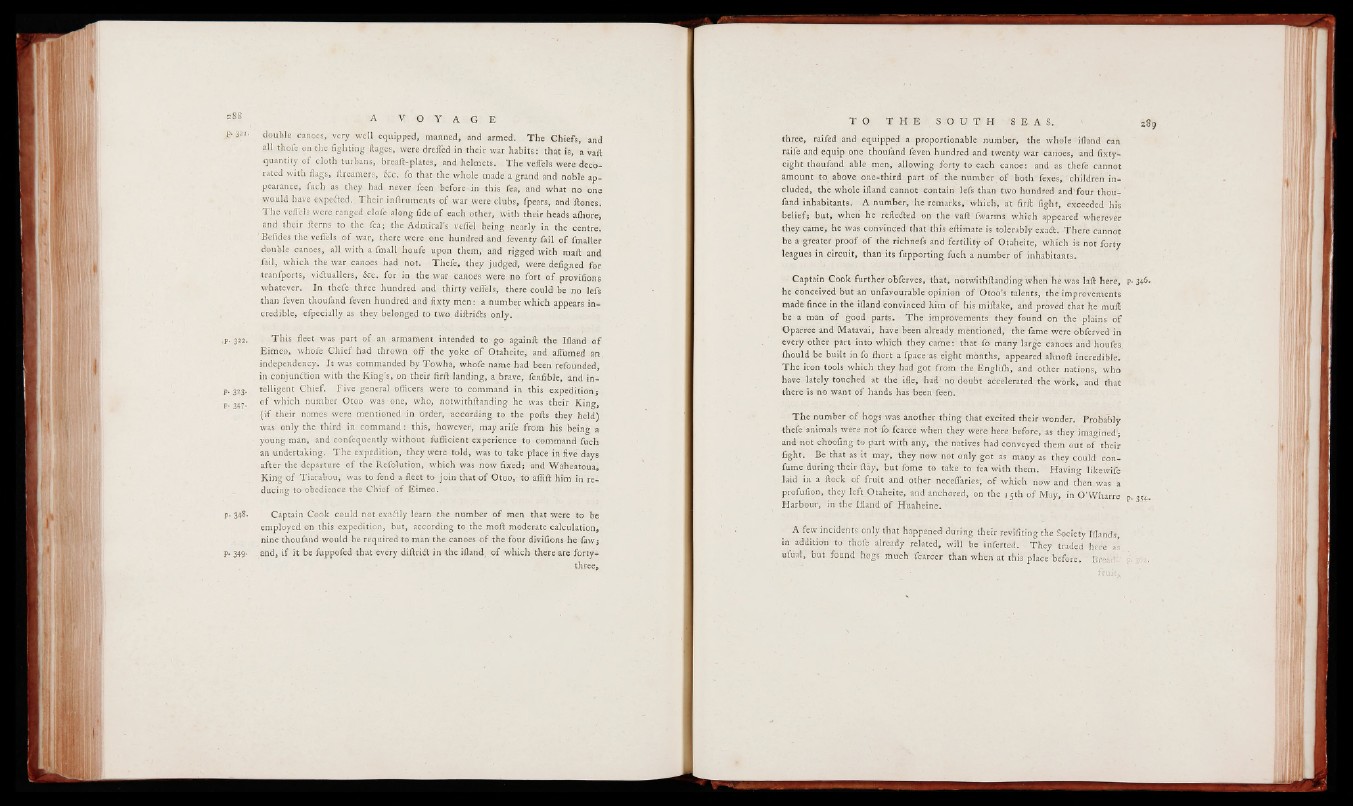
I f .
I '
288 A V O Y A G E
^ 3211 double canoes, very well equipped, manned, and armed. The Chiefs, and
all thofe on the fighting flages, were drelTed in their war habits: that is, a vaft
quantity o f cloth turbans, breaft-plates, and helmets. The veflels were decorated
with flags,...ftreamers, &c, fo that the whole made a grand and noble appearance,
fuch as they had never feen before an this fea, and what no one
would have expetted. Their inftruments of war were clubs, fpears, and flones.
The veflels were ranged clofe along fide o f each other, with their heads afhore,
and their flerns to the fea; the Admiral’s veflel being nearly in the centre.
'Befides the veflels of war, there were one hundred and feventy fail of fmaller
double canoes, all with a fmall houfe upon them, and rigged with mail and
fail, which the war canoes had not. Thefe, they judged, were defigned for
tranfports, victuallers, &c. for in the war canoes were no fort of provifions
whatever. In thefe three hundred and thirty veflels, there could be no lefs
than feven thoufand feven hundred and fixty men: a number which appears incredible,
efpecially as they belonged to two diilritts only.
,p. 322. This fleet was part of an armament intended to go againfl the Ifland of
Eimoo, whofe Chief had thrown off the yoke of Otaheite, and aflumed an.
independency. It was commanded by Towha, whofe name had been refounded,
in conjunction with the King’s, on their firit landing, a brave, fenfible, and in-
p. 323. telligent Chief. Five general officers were to command in this expedition;
p-347% . of which number Otoo was one, who, notwithflanding he was their King,
(if their names were mentioned in order, according to the polls they held)
was only the third in command: this, however, may arife from his being a
young man, and confequently without fufficient experience to command fuch
an undertaking. The expedition, they were told, was to take place in five days
after the departure of the Refolution, which was now fixed; and Waheatoua,
King of Tiarabou; was to fend a fleet to join that of Otoo, fo aflifl: him in reducing
to obedience the Chief of Eimeo.
p* 348. Captain Cook could not exattly learn the number of men that were to be
employed on this expedition, but, according to the moil moderate calculation,
nine thoufand would be required to man the canoes of the four divifions he faw;
p. 349. and, if it be fuppoied that every diftritt in the ifland, o f which there are fortythree,
three, raifed and equipped a proportionable number, the whole ifland can
raife and equip one thoufand feven hundred and twenty war canoes, and fixty-
ejght thoufand able men, allowing forty to each canoe: and as thefe cannot
amount to_ above one-third part of the number of both fexes, children included,
the whole ifland cannot contain lefs than two hundred and'four thou-
fand inhabitants. A number, he remarks, which, at firfl fight, exceeded his
belief; but, when he refletted on the vail fwarms. which appeared wherever
they came, he was convinced that this eflimate is tolerably exatt. There cannot
be a greater proof of the richnefs and fertility of Otaheite, which is not forty
leagues in circuit, than its fupporting fuch a number of inhabitants.
Captain Cook further 'obferves, that, notwithilanding when he was lafl here, P» 3+6»
he conceived but an unfavourable opinion of Otoo’s talents, the improvements
made fince in the ifland convinced him of his miiiake, and proved that he muft
be a man of good parts; The improvements they found on the plains- of
Oparree and Matavai, have been already mentioned, the fame were obferved in
every other part into which they came: that fo many large canoes and houfes.
ihould be built in fo fhort a fpace-as eight months, appeared almofl incredible.
The iron tools which they had got from the Engliih, and other nations, who
have lately touched at the ifle, had no doubt accelerated the work, and that
there is no want of hands has been feen.
The number of hogs was another thing that excited their wonder. Probably
thefe animals were not fo fcarce when they were here before, as they imagined;
and not choofing to part with any, the natives had conveyed them out of their
fight. Be that as it may, they now not only got as many as they could con-
fume during their flay, but fome to take to fea with them. Having likewife
laid in a flock of fruit and other neceflaries;* of which now and then.was à
profiifion, they left Otaheite, and anchored, on the 15th of May, in O’Wharre p. 354,
Harbour, in the Ifland of Huaheine.
A few incidents only that happened during their revifiting the SocietyTflands,
in addition to thofe already related, will be inferted. They traded here ai
ufual, but found hogs much fcarcer than when at this place before. Bread-'
m m m h h , i h i